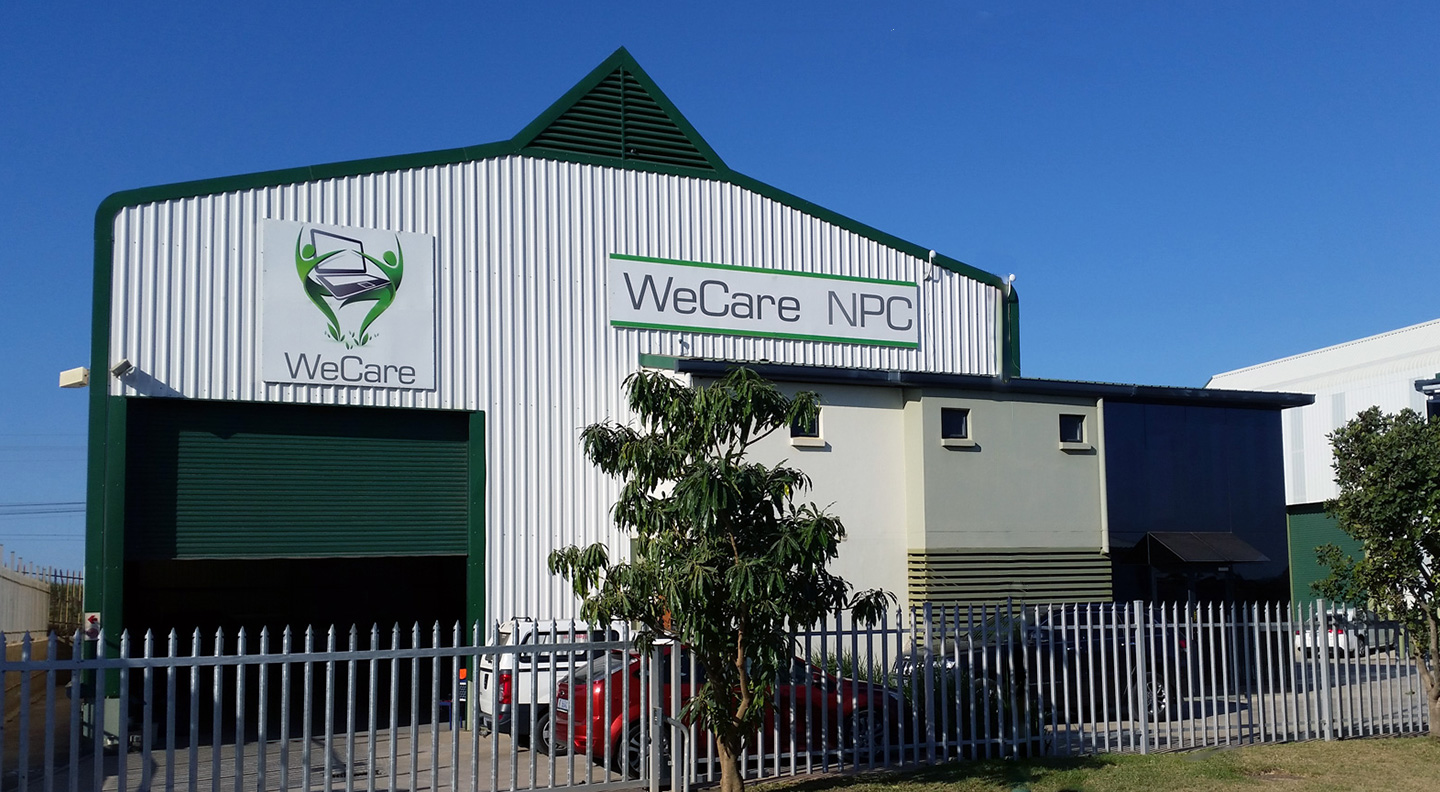A unique corporate responsibility initiative which involves retired electronics, e-waste and creating opportunities in South Africa’s rural communities.
The WeCare Program founded in 2012, aims to increase computer literacy throughout Africa by making inexpensive used IT technology available to communities and disadvantaged schools. Besides bridging the digital divide in Africa, the program is also creating jobs, removing and recycling e-waste, and educating people about e-waste and refurbished electronics.
“A few years ago, we were seeing that vast numbers of people in South Africa’s rural communities had no access to IT equipment, preventing them from learning essential skills,” says Allan Werth, country manager South Africa, Sims Lifecycle Services. “We also realized that many older PCs, that might not be of interest to corporate customers, still worked perfectly and could be used to learn computer skills, email, access the internet, print, or write letters and CVs, for example.”
“In South Africa, poorer schools had one PC for every 50 students. The WeCare program was initiated so that there would be one PC for every two students. To meet the demand for affordable secondhand equipment, Sims began asking corporate and government customers to directly donate used equipment, or sell it below regular second hand value. The equipment is refurbished and sold by Sims to WeCare at very competitive pricing. As a registered charity, we can issue 18A certificates, which means companies can deduct the value of materials they’ve given or sold to us as a charity donation. This equipment is checked, repairs are made, asset tags are removed, data is erased, and Windows and Office software installed.”
“Initially, we started selling refurbished computers to schoolchildren’s parents, later these were also installed in schools, along with peripheral equipment such as printers. The idea was to work with the government to provide computer rooms for schools that desperately needed them. PCs are supplied with a three-month warrantee and a three-year support plan as well as Internet access.”
One of the first schools to benefit from the WeCare Program was Bongimfundo Primary School, a 140-pupil school located in South Africa’s rural KwaZulu-Natal North Coast. The school received 10 refurbished Dell computers. “A few years ago, another school some 40 kilometers from our offices, in an area mainly populated by sugar cane farmers wasn’t performing well and there was talk of it being shut down. The decision was made to help them by building and providing support for a computer room. Today, this is the only school in the wider area with a working computer room and is attended by 350 children. To date, four projects have been rolled out; supplying schools with sets of 50 PCs, two servers and a printer, connected to a local area network. There would be no point in bringing computers to areas lacking support, so the WeCare program also provides this.”
“To do so, we’ve launched a number of Support Containers: sea containers that act as workshops, sales and support outlets and training facilities. Each container is run by a team of three people, identified with the local municipality and community, who are trained by WeCare to install, support and maintain the PCs at schools.”
“WeCare dismantler containers serve as technological hubs for the communities in which they operate. They are owned and operated by local entrepreneurs. After receiving basic PC and cellphone repair training, they can sell Sims-supplied refurbished PCs, notebooks, and cellphones, provide internet, copy, print, and fax services, and offer adult computer training classes. They also serve as e-waste collection points – when equipment breaks down, people can hand it in and collect a deposit. Thanks to this deposit system, computers are returned and collected at the very end of their functional lifetime. This is done to prevent them from ending up in landfill sites or in improperly managed e-waste streams. The containers are also often the only WiFi hotspot in a wide radius, for example 50 kilometers and the only computer shop or repair facility for hundreds of kilometers.”
“We’re using all of our skills to make sure electronic equipment is refurbished and put to good use instead of being dumped. The entire concept has also been tailor-made for Africa, taking the geography, logistics and ways of thinking and working into account. We’ve learned a great deal during the process. For example, we found out that printed flyers promoting the WeCare concept didn’t generate much interest, but when we made stickers and stuck them to bags of crisps, they would get noticed! The program has also provided us with a great opportunity to reach out and get involved with various communities. We’ve organized beach cleanups with schools, sponsored sports days, and organized competitions and other activities.”
“Response from the academic community has been overwhelming: there’s been a great deal of interest and extremely positive reactions from students, parents, teachers, principals and other stakeholders. We’re now offering to build and service containers for schools and community centers that can be sponsored by a company or institution. We recently promoted this at the Comic Con Africa convention, which welcomed 200,000 visitors. Our promotion included everything from a robot and a popcorn machine to people in superhero costumes. It’s important to speak to people from companies at this type of event, and explain how we’re making a difference, because there are so many charities to choose from in Africa. However, more companies are now seeing that by participating in the WeCare Program they can make good on their corporate social responsibility commitments and provide access to affordable computers that help enhance essential computer literacy.”
